
The scene is the same as the start of any sunny June nursery day. Parents drop off their children at the gate. Nursery workers greet them warmly, help them remove their backpacks, check their sunhats are on. And off the children run to play on the trampoline or climbing frame, with a cheerful shriek. But a closer look reveals something different: a pile of sandbags by the kindergarten’s wall. The children’s bags kept nearby in case an air-raid siren goes off. Parents lingering a little longer, perhaps, as they say goodbye. This is wartime early education in Ukraine. And these children, who can still go to nursery, are the lucky ones. 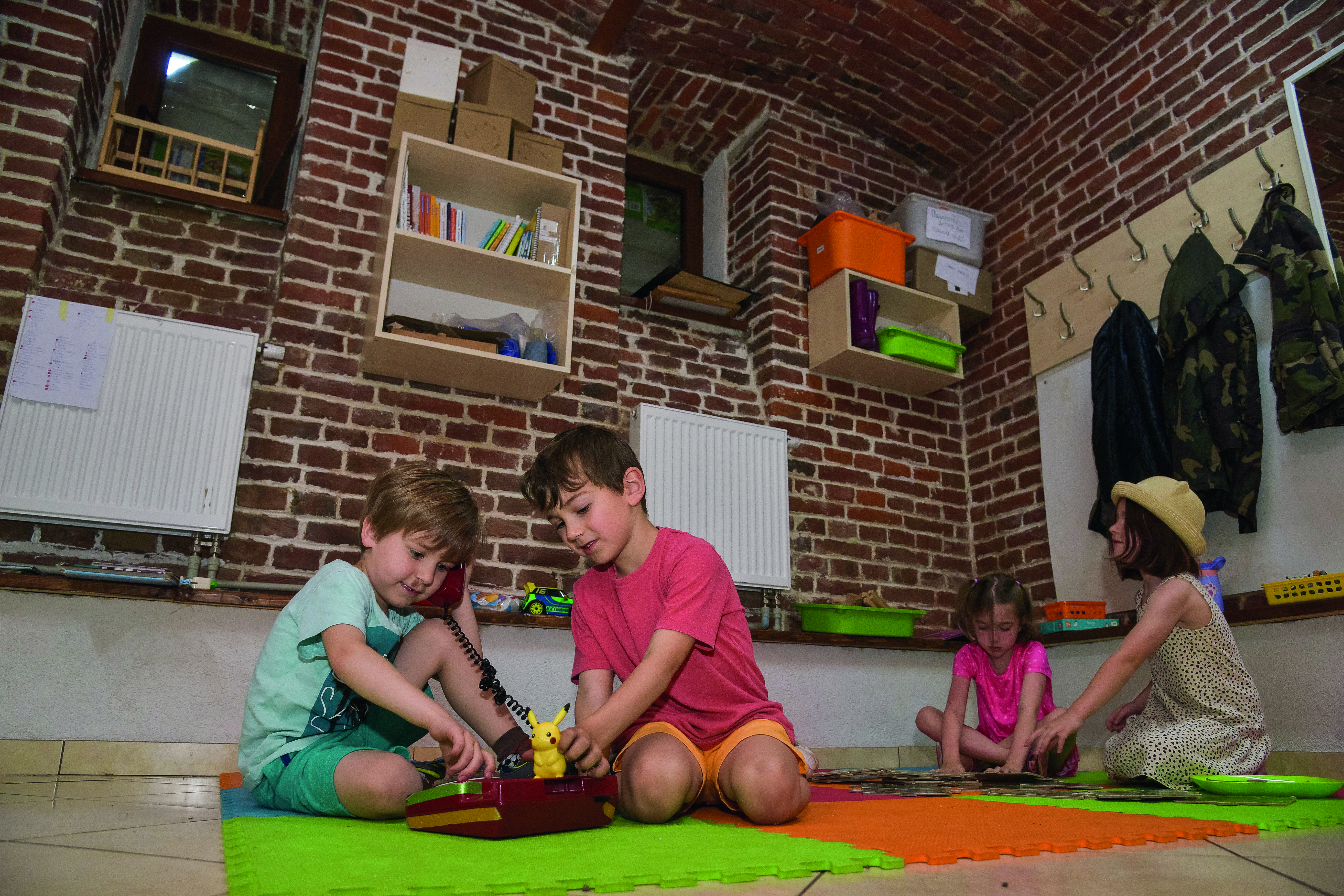
Ptashenya Kindergarten (Birdy Kids’ Place in English – pictured above and below) is in Lviv, a city 70km from the Polish border. Since Russia’s invasion on 24 February, missiles have struck targets outside the city, but it was considered safe enough for education providers to operate.
The private setting’s co-founder, Solomiya Boikovych, and her team began preparing for war in December 2021, following government recommendations. Russian troops were gathering on the country’s borders. ‘It was really difficult,’ Boikovych remembers. ‘We didn’t know what would happen.’
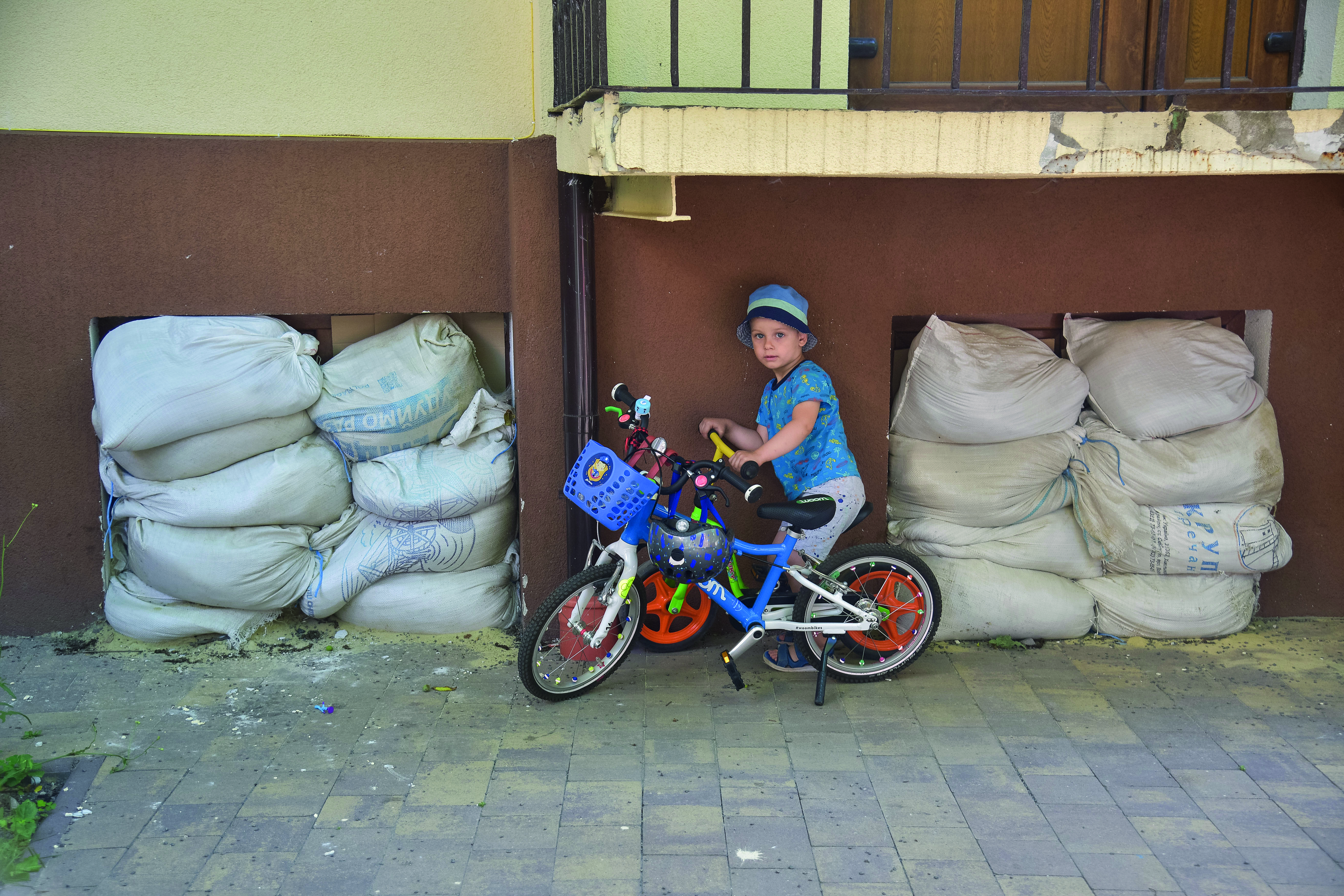
They adapted the basement of the four-storey converted house, which was being used as offices, into a bomb shelter – now a government requirement. ‘We blocked the windows with sandbags in case of a blast,’ says Boikovych. ‘We collected enough food and water to last a week, and prepared badges for each child to wear when air-raid sirens went off with their name, parents’ contact details and their blood type.’ Staff replaced ‘wash your hands’ posters hung on the walls during the Covid-19 pandemic with evacuation instructions. They practised getting the 80 children in the setting into orderly lines and moving calmly downstairs to the shelter.
When the war started, no-one was at the nursery. Early on a Thursday morning, Russian missiles began falling across Ukraine, including the capital Kyiv, and troops invaded from multiple directions. ‘I wrote to all my teachers from home that day to say we would be closed until Monday,’ Boikovych says. ‘We thought it would only last three days.’
Nearly six months later, Ukraine is still a warzone. Out of a population of 7.5 million children, United Nations (UN) agency Unicef estimates three million are ‘internally displaced people’, while 2.2 million are living in refugee-hosting countries. The UN reported on 4 July that 335 children had been killed since the war began and 521 injured, although it believes actual figures are ‘considerably higher’.
REOPENING AGAINST THE ODDS
At least 729 kindergartens across the country had been damaged or destroyed by bombing and shelling by 10 June, out of 14,974 state-funded settings. So far, 2,188 of all education institutions had been damaged or completely destroyed. Despite the situation, on 14 June, Ukraine’s minister of Education and Science, Serhiy Shkarlet, announced that 1,400 state kindergartens had reopened, 2,600 were operating online, and 130 were providing a mixture of online and offline education. The rest – around 72 per cent – remained closed.

But as a private nursery, of which there are far fewer in Ukraine – only about three per cent of the total – Boikovych’s staff were not receiving pay from the state. ‘For people abroad who do not know what it is to live in a war, it may sound crazy that kids are attending schools or kindergartens. But we cannot pause our lives – we need to survive, and we need to help our country’s economy,’ she says.
This pressure, and demand from parents, led Boikovych to reopen her kindergartens four weeks after the war began. The requests arrived from new parents to the area – those who had fled to Lviv. Currently about a third of children at the kindergarten are from outside the region. The first week back, air-raid alarms sounded five times during the day, every day. ‘It was very scary,’ recalls Boikovych. ‘But the children reacted well. Because we had prepared them, they were calm. They just picked up their toys and carried them down to the shelter.’ The children play in the shelter, read books, or watch cartoons. ‘We message the parents to let them know they are OK,’ she says.
However, air raids have proved to be less manageable during naptime. In Ukraine, the government requires pre-schoolers to have a nap between 12pm and 3pm. Having to wake and carry or coax small children down from the third floor was not only difficult for practitioners but upsetting for the children. Boikovych overcame the problem by moving the cots into the shelter, and using it for naps everyday. ‘This is a problem for lots of kindergartens and why some of them are not opening,’ she explains. ‘In a public kindergarten, there might be 30 kids and one teacher in a group, with an outdoor shelter. They cannot wake, dress and move them all.’
Explaining the war to the children has been challenging. Julia Kushch, teacher for two to three-year-olds, says she taught her group how to respond to the sirens using a fairy tale about a wolf, and a wolf glove puppet. ‘The wolf howls to his pack if they have to hide somewhere,’ she explains. ‘When the sirens sound we talk about the wolf as we take the children downstairs.’ She says children at this age don’t understand what is going on in any depth. ‘They don’t imagine there might be shelling when the sirens go off, or some serious consequences,’ she says.
HIDDEN TRAUMA
Kushch thinks the children in her class are generally feeling okay but is concerned about one boy, Artem*, who fled from an embattled city. He acted out being shot and killed during a game. ‘When I said “Stop!”, Artem fell to the floor as if he’d been killed,’ she says. ‘I spoke to our psychologist about him and they had a chat, but he didn’t reveal anything. Maybe Artem has seen that in real life, on TV or just heard people talking about it.’
She adds, ‘At first the kids were more stressed out. But now the reality of war is becoming normal for them. However, it is possible these children have seen something terrible that they might remember for the rest of their lives, but they are just not talking about it.’
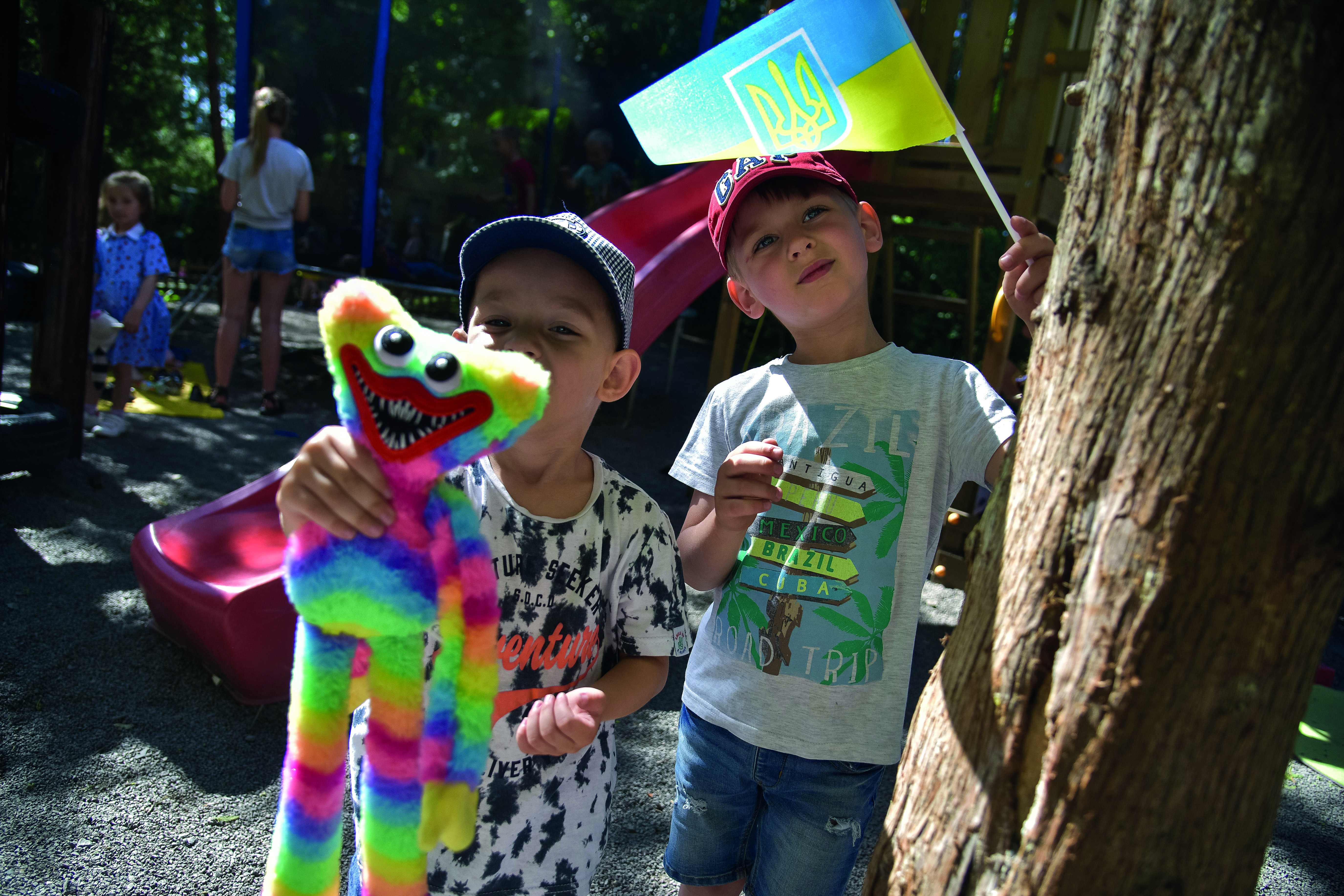
Boikovych says the setting has followed a policy of being truthful about events, by using age-appropriate language. ‘Some adults are trying to protect children from grief or pain by keeping the real world hidden,’ she explains. ‘But if we want to raise strong children who can deal with difficulties, they need to know the truth.’ Boikovych says her eight-year-old daughter asked her one night at bedtime to cut Russia out of her globe and throw it in the bin. ‘It’s her way of dealing with these things,’ she says. ‘If we allow children to do this, it’s healing.’
Another teacher, whose name we cannot publish for security reasons, told us about Olek* who has symptoms of trauma. His father has left the family to join the military. Martial law states that all men aged 18 to 60 are eligible for military service and cannot leave the country. This is why many families displaced outside Ukraine are mothers and children. There are some exceptions, such as men with poor health, or fathers of three or more children. However, many have voluntarily joined the army to defend their country.
Olek dashes around the playground with his friends, dodging toys strewn around under the trees, like any carefree boy. But his teacher says he gets upset easily, cries more than he used to, and has become more stubborn. ‘Whenever he draws a picture or makes something he says, ‘I’ll give it to daddy when he comes back,’’ she says.
Staff keep a close eye on Olek, but are careful not to make him feel different from other children. They also provide advice to his mother about managing his behaviour. ‘We tell Olek everything will be ok and he’s becoming calmer,’ says the teacher. ‘But of course we don’t know if, or when, his dad will come back. He’s at war.’
STATE SIDE
Across town, Malyuk state primary school and kindergarten also reopened in late March (pictured below). While Ptashenya is in many ways indistinguishable from a British nursery, Malyuk is visibly different. Its building and routines are closer in style to the traditional pre-school education of the Soviet Union era, which ended when it collapsed in 1991. Built in 1973, the enormous purpose-built grey-brick block is surrounded by a large outdoor area, including several playgrounds, gardens and open spaces. The kindergarten has five classes for 150 children aged from two to six. It also has five classes for 146 primary school age children from years one to four.
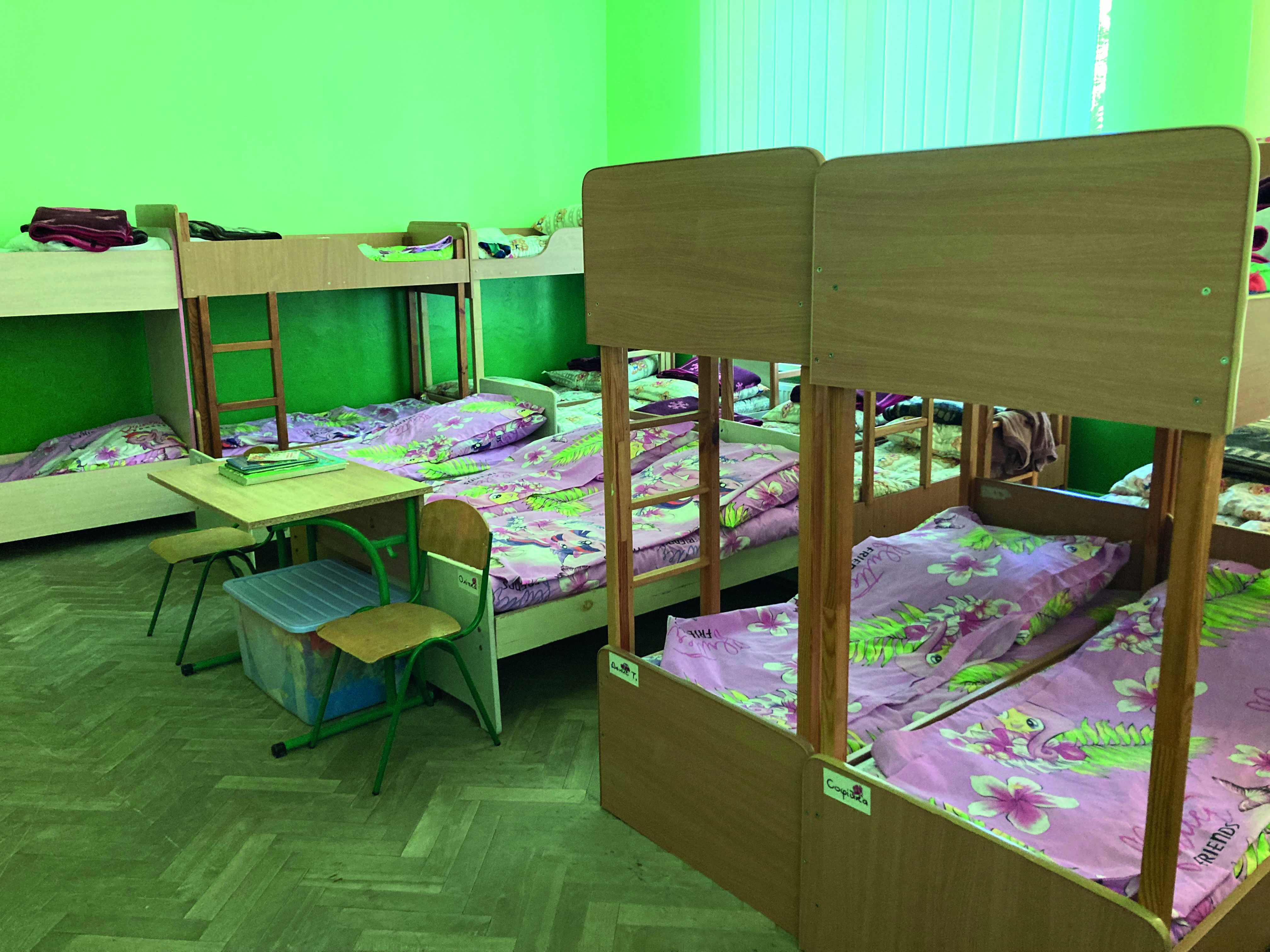
Each pre-school classroom has its own name (such as ‘little suns’, ‘ladybirds’ and ‘raindrops’), its own cloakroom, bathroom and nap room, where each child has a named bed. Extra classrooms are also on site for children with special needs or disabilities. There is a hall for music, performances and PE, a library, and a kitchen that serves three meals a day. In the state system, parents only pay about 40 per cent of food costs – everything else is free for eight hours a day, five days a week, including in the school holidays.
However, the pedagogy delivered inside the setting by director Oksana Rosypska and her team is progressive for Ukraine. She has modernised its approach to teaching with guidance from the International Step by Step Association, and aims to meet standards set by the Early Childhood Environment Rating Scale programme. Teaching is play-based, includes plenty of time outdoors, and children only need to achieve a basic understanding of the alphabet before primary school. Attending pre-school is not compulsory, except in the final year.
Malyuk was able to reopen because it has a basement to act as a bomb shelter. Unfortunately, although structurally sound, it is unfinished and lacks a proper floor, lighting and the ceiling is very low. ‘When it rains, water rises up from the ground,’ Ms Rosypska describes. ‘It’s impossible to plumb-in a toilet, so we have bought a commode.’ She needs more funding to improve the conditions, but says they are adequate. ‘We sing songs when we go down and the children are not afraid.’
When the setting first reopened, only eight children attended. ‘They were allowed to come under the condition that both parents provided letters to confirm they were working,’ says Rosypska. The regional board of education also issued guidelines about managing evacuations during air raids. Each child must be allocated to a specific member of staff, and staff must keep certain ratios with the children. ‘This meant we had to turn away some children because I didn’t have enough teachers,’ Rosypska says. 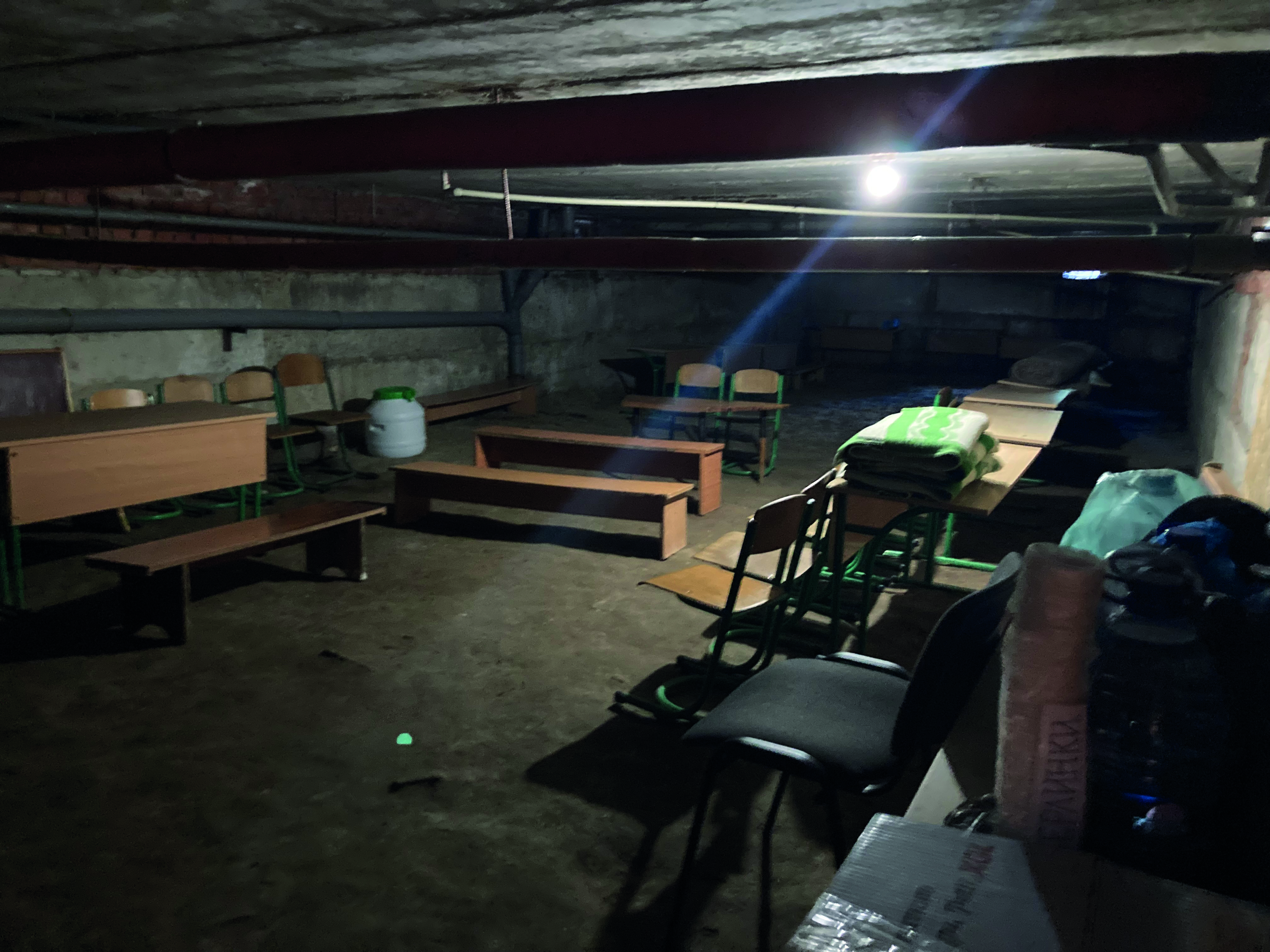
MOTHER TONGUE
Among the children attending the kindergarten are some who have fled frontline zones. Four-year-old Danyko* came from one of the eastern territories occupied by Russia since 2014. Rosypska says he did not experience too much stress, but it has been difficult for him to settle in an area that is not Russian-speaking. Ukraine is a vast country, with wide linguistic differences, and much of the population in the East speak a different language from those in the West. ‘When he was misunderstood when he spoke Russian, he became aggressive,’ says Rosypska. However, he has made new friendships, which is encouraging him to learn Ukrainian.
The setting has an in-house psychologist who works closely with the children to manage stress. Staff have taken part in online seminars provided by charities and the Lviv Regional Military Administration about how to support children’s mental wellbeing, and their own. ‘Staff are finding it hard,’ says Rosypska. ‘Some staff were so stressed they had to leave the country. We have parents arriving from areas such as Kharkiv, Luhansk – places where there have been such terrifying situations.’ 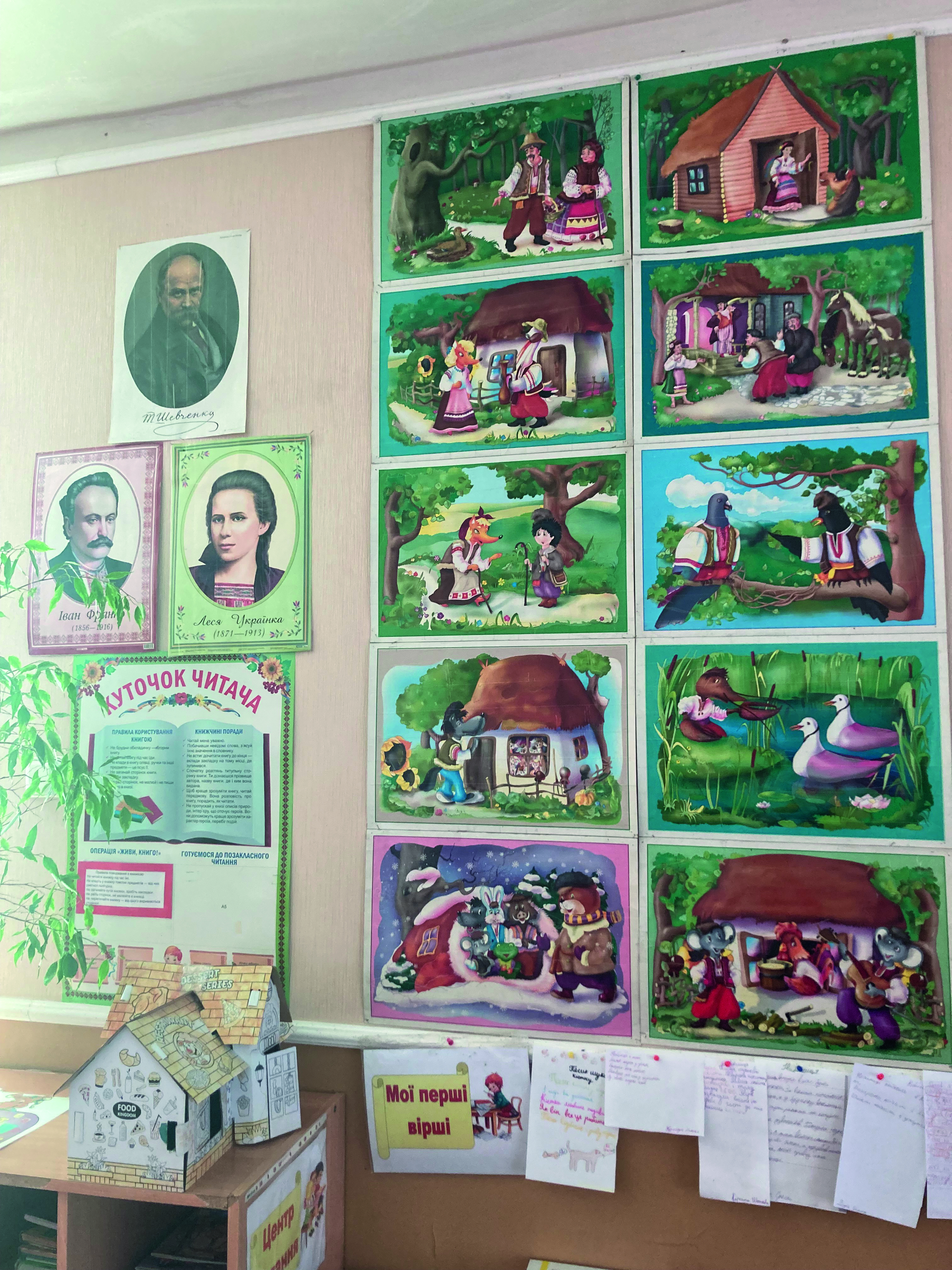
DISPLACED
The children in Ukraine who have been able to return to daycare are in the minority. Lviv alone is housing about 200,000 displaced people, many of whom are children. Hundreds still arrive every day as Russia continues its onslaught in the East. Some of families have been able to rent their own accommodation. Others have received a small temporary space to call their own. The Polish government has begun constructing modular housing, or ‘container villages’, for up to 20,000 people. Others are living in shared rooms or dorms in shelters across the region in any space available: football stadiums, schools, holiday camps, offices, restaurants, etc.
At a container village in Striyski Park in Lviv, Unicef psychologist Natalia Tybura, who works with displaced children, says parents were increasingly presenting aggressive behaviour towards their young children as they became frustrated with the ongoing situation. She says children lack routine, which can be harmful for their development. They are missing loved ones left behind or who are fighting. ‘About 20 per cent of these children will need therapy for a long period of time,’ she adds.
Maryna Stoliar, an expert on early childhood and pre-school education at the Reform Support Team of the Ukraine Ministry of Education and Science, says providing online education during war is harder than during the pandemic. ‘All of us were at home then,’ she says. ‘Now it’s not like that. The whole sector is concerned about how the trauma of war will affect the children.’ Stoliar has heard reports of pre-school teachers struggling to cope with children experiencing panic attacks, and points out that many teachers themselves are traumatised. 'Our teachers just don't have the experience of working with kids who have war-induced trauma' she says.
Stoliar is currently working on an early years sector recovery plan. But in regions of the country that have been captured by Russia, the government has lost contact with its educational institutions as occupying forces introduce their own systems. ‘Before the war started, we were working on a reform programme in early education – trying to improve access and quality in provision,’ she says. ‘Now we’re working on a recovery plan for after the war, without knowing when it will actually end. We are struggling in the middle of nowhere.’ She pauses to catch her breath and fight back tears. ‘We just want life to go back to how it was before.’
Names have been changed
This article was supported by a fellowship from the Dart Center at Columbia Journalism School.









